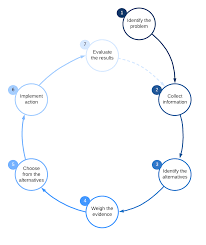Examples of Ethical Decisions
When faced with ethical dilemmas, individuals are often confronted with difficult choices that require careful consideration of moral values and principles. Ethical decisions are those that involve weighing the potential consequences and impact on others, while adhering to a set of ethical standards. Here are some examples of ethical decisions that people may encounter in various aspects of life:
Business Ethics:
In the business world, ethical decisions play a crucial role in maintaining trust and integrity. For instance:
- Whistleblowing: An employee discovers illegal activities within their organization and must decide whether to report it, potentially risking their job security.
- Fair Trade: A company decides to source its products from suppliers that adhere to fair labor practices and pay fair wages.
- Environmental Responsibility: A corporation invests in sustainable practices to minimize its ecological footprint.
Healthcare Ethics:
In the healthcare field, ethical decisions can have profound impacts on patients’ well-being and quality of care. Some examples include:
- End-of-Life Care: A family must decide whether to continue life-sustaining treatment for a terminally ill loved one or opt for palliative care.
- Informed Consent: A doctor explains potential risks and benefits of a medical procedure to a patient, allowing them to make an informed decision about their treatment.
- Patient Confidentiality: Healthcare professionals must maintain patient privacy by not disclosing sensitive medical information without consent.
Personal Ethics:
Individuals often face ethical decisions in their personal lives, where their actions may impact themselves and those around them. Some examples include:
- Honesty: A person finds a lost wallet containing money and must decide whether to return it to its rightful owner.
- Charitable Giving: Someone decides to donate a portion of their income to support causes they believe in.
- Animal Welfare: A person chooses to adopt a rescue animal instead of buying one from a breeder.
These examples illustrate the diverse range of ethical decisions individuals may encounter in different aspects of life. It is important to remember that ethical dilemmas can be complex, and the right course of action may not always be clear-cut. Seeking guidance from trusted mentors or consulting professional codes of ethics can help navigate these challenging situations.
“Exploring Examples of Ethical Decision-Making”
“Everyday Ethics: Common Daily Decisions with Moral Implications”
4. “Identifying the Hallmarks
- What are 3 examples of ethical decisions businesses have to make?
- What are some examples of an ethical decision?
- What are some of the ethical decisions you make on a daily basis?
- What is the best ethical decision?
- What are good ethical decisions?
What are 3 examples of ethical decisions businesses have to make?
Businesses often face numerous ethical decisions that can significantly impact their reputation, stakeholders, and long-term success. Three common examples of ethical decisions businesses have to make include whistle-blowing, fair trade practices, and environmental responsibility. Whistle-blowing involves employees reporting illegal activities within the organization, which may pose a dilemma between loyalty to the company and upholding ethical standards. Fair trade practices require businesses to source products from suppliers that adhere to fair labor practices and pay fair wages, ensuring social responsibility throughout the supply chain. Additionally, businesses must consider environmental responsibility by adopting sustainable practices to mitigate their ecological footprint and contribute positively to the environment. These examples highlight the complex ethical considerations that businesses encounter in their operations.
What are some examples of an ethical decision?
Ethical decisions encompass a wide range of scenarios where individuals are faced with choices that have moral implications. Some common examples of ethical decisions include whistleblowing, where an employee exposes illegal activities within their organization, deciding to source products from suppliers that adhere to fair labor practices, and investing in sustainable practices to minimize environmental impact. In healthcare, ethical decisions may involve end-of-life care choices, obtaining informed consent from patients, and maintaining patient confidentiality. On a personal level, ethical decisions can include acts of honesty like returning a lost wallet, charitable giving, and making choices that promote animal welfare. These examples highlight the diverse nature of ethical decisions and the importance of considering the potential consequences on others while adhering to moral principles.
What are some of the ethical decisions you make on a daily basis?
On a daily basis, we encounter numerous ethical decisions that shape our actions and interactions with others. Some common examples include choosing to be honest and transparent in our communication, treating others with respect and fairness, respecting the privacy of individuals, making environmentally conscious choices, and being accountable for our actions. Additionally, ethical decisions may arise when deciding whether to lend a helping hand to someone in need, practicing empathy and compassion towards others, or adhering to professional codes of conduct. These are just a few examples of the ethical decisions we make every day as we navigate through various personal, professional, and social situations.
What is the best ethical decision?
The concept of the “best” ethical decision is subjective and can vary depending on the specific circumstances and values of individuals or organizations involved. Ethical decisions are not always black and white, as they often require weighing different factors and considering the potential consequences. The best ethical decision is typically one that aligns with a set of moral principles, promotes fairness, respects the rights and dignity of others, and aims to minimize harm while maximizing benefit. It is important to approach ethical decision-making with careful thought, consideration, and an understanding of the potential impacts on all stakeholders involved.
What are good ethical decisions?
Good ethical decisions are those that align with moral principles and values, taking into consideration the potential impact on others and society as a whole. They involve making choices that prioritize honesty, fairness, respect, and compassion. Good ethical decisions often involve weighing competing interests and finding a balance that promotes the greater good. These decisions may require individuals to act with integrity, uphold their responsibilities, and make choices that reflect their commitment to ethical standards. Ultimately, good ethical decisions contribute to building trust, fostering positive relationships, and creating a more just and compassionate world.




